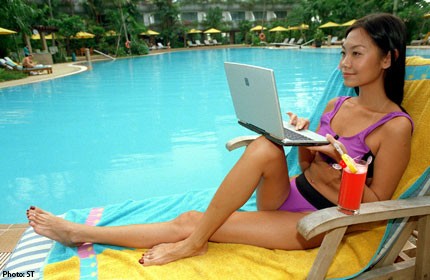Singapore workers too stressed to clock off during vacations


A new survey has revealed that 45 per cent of Singapore's working professionals have admitted that they would work one to three hours a day even if they are on holidays. A further 22 per cent indicated that they would devote more than three hours a day to these work-related tasks.
Workplace service provider Regus asked over 26,000 business people from 96 countries to tell them how much of their holidays are spent on work-related activities.
Singaporeans seem to be working harder on vacation than other nationalities. 40 per cent of those surveyed confirm that their level of attention to work while on holiday will equate to a slightly reduced 'business as usual' level, according to Regus.
Worldwide, 39 per cent of business professionals take a slightly reduced 'business as usual' approach to their holiday, while 17 per cent plan to work more than three hours a day and 41 per cent say they dedicate one to three hours a day to work.
The research also found that men have the most difficulty switching off with 48 per cent of men in Singapore turning their vacation into nothing more than business as usual by vowing to make calls, respond to emails, and attend to business during their vacation. A smaller proportion of professional women (26%) are committed to the same level of work.
This gender trend in Singapore is confirmed with 51 per cent of male respondents saying that they will work between one and three hours a day, compared with 36 per cent of women.
John Henderson, Regus Regional Director for Asia Pacific said: "The dedication people worldwide and are showing towards their jobs is admirable with a huge percentage of business professionals taking their work away with them.
"However, this can also be interpreted as an indication that they feel overstretched or insecure in their jobs and are unable to properly switch off. The effects of work place stress are well documented so it is important that workers carve out some personal time."
Mr Henderson also attributed this pattern of working on vacation to increased connectivity. "On the one hand technology, such as video communications and Wi-Fi, has certainly made working from almost anywhere in the world a reality, on the other this innovation should be channeled towards helping professionals work more flexibly and productively.
"Allowing workers reduce their commute or work closer to home can help professionals work more efficiently so they can really devote their holidays to relaxing."
maryanns@sph.com.sg